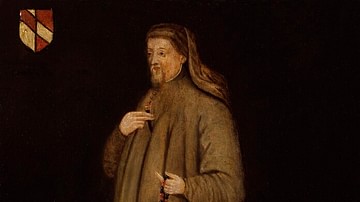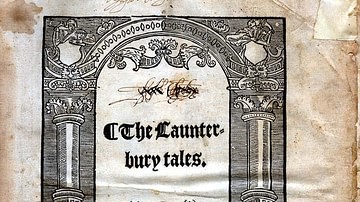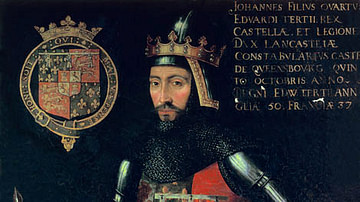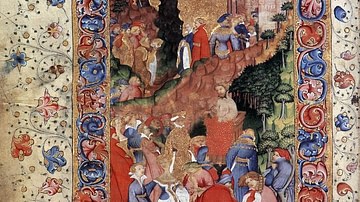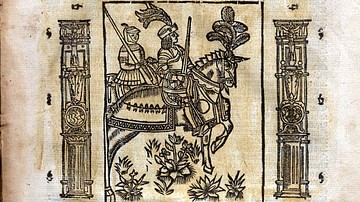Video
by The Historian's Hut
published on 08 April 2019
The great English poet, Geoffrey Chaucer, was born in 1342. When he was around fifteen years of age, he managed to gain a position as page to the Countess of Ulster, serving mainly as a servant and messenger. Two years later, in 1359, Chaucer was sent to fight in the long-running Hundred Years War between England and France. He was quickly captured by the French near Rheims, but King Edward III (the Countess of Ulster’s father-in-law) paid the poet’s ransom in 1360.
Literature Chaucer encountered in France may have ignited the poet’s literary interests. He started simple, translating the medieval French classic, the Roman de la Rose (Romance of the Rose), into English. Besides French and English, Geoffrey Chaucer was also known to understand Italian and Latin. Religion was another field of interest for the poet, and he could quote freely from Christian texts that were both canonical and apocryphal.
Eventually, Geoffrey Chaucer was promoted from his position as a page to the countess of Ulster to be a valet to the king of England. Around the same time he received his position as valet (in 1367), Chaucer also married his wife, Philippa de Roet, the sister-in-law of Chaucer’s greatest patron, John of Gaunt. Chaucer continued to ascend in rank, becoming Comptroller of customs and subsidies in 1374, and was then promoted to Comptroller of petty customs. Chaucer was next appointed as Justice of the Peace for the region of Kent in 1385, and became a Knight of the Shire (for Kent) in 1386.
Chaucer likely began his most famous work, The Canterbury Tales, around 1386, an ambitious epic poem in which he planned to include thirty pilgrims telling four stories, each. By the time he died in 1400, he unfortunately had only completed tales for twenty-four pilgrims. In addition to The Canterbury Tales, Geoffrey Chaucer also wrote The Book of the Duchess, ABC of the Virgin, House of Fame, The Parliament of Fowls, Troilus and Criseyde, and The Legend of the Saints of Cupid.
All images used in the creation of this video are either Public Domain or appropriately licensed for use via the Creative Commons.
Intro music written and performed by C. Keith Hansley for use on this YouTube channel.
The atmospheric background music in the video is:
Folk Round by Kevin MacLeod is licensed under a Creative Commons Attribution license (https://creativecommons.org/licenses/by/4.0/)
Source: http://incompetech.com/music/royalty-free/index.html?isrc=USUAN1100357
Artist: http://incompetech.com/
License & Copyright
Original video by The Historian's Hut. Embedded by Arienne King, published on 08 April 2019. Please check the original source(s) for copyright information. Please note that content linked from this page may have different licensing terms.
The video and its description text are provided by Youtube. This website claims no authorship of this content; we are republishing it for educational purposes.
Cite This Work
APA Style
Hut, T. H. (2019, April 08). The Life of Geoffrey Chaucer.
World History Encyclopedia. Retrieved from https://www.worldhistory.org/video/1719/the-life-of-geoffrey-chaucer/
Chicago Style
Hut, The Historian's. "The Life of Geoffrey Chaucer."
World History Encyclopedia. Last modified April 08, 2019.
https://www.worldhistory.org/video/1719/the-life-of-geoffrey-chaucer/.
MLA Style
Hut, The Historian's. "The Life of Geoffrey Chaucer."
World History Encyclopedia. World History Encyclopedia, 08 Apr 2019, https://www.worldhistory.org/video/1719/the-life-of-geoffrey-chaucer/. Web. 17 Apr 2025.
